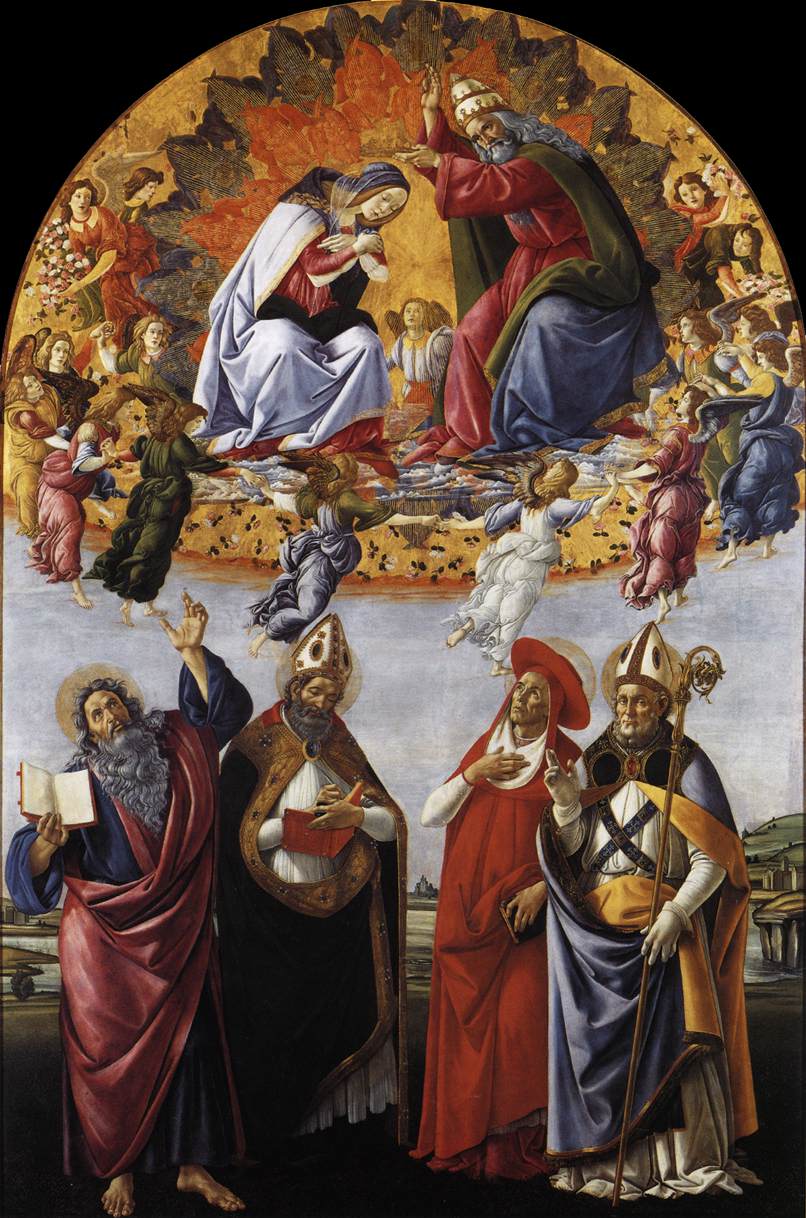13. And one of the company said to him, Master, speak to my brother, that he divide the inheritance with me.
14. And he said to him, Man, who made me a judge or a divider over you?
15. And he said to them, Take heed, and beware of covetousness: for a man's life consists not in the abundance of the things which he possesses.
AMBROSE; The whole of the former passage is given to prepare us for undergoing suffering for confessing the Lord, or for contempt of death, or for the hope of reward, or for denunciation of the punishment that will await him to whom pardon will never be granted. And since covetousness is generally wont to try virtue, for destroying this also, a precept and example is added, as it is said, And one of the company said to him, Speak to my brother, that he divide the inheritance with me.
THEOPHYL. As these two brothers were contending concerning the division of their paternal inheritance, it follows that one meant to defraud the other; but our Lord teaches us that we ought not to be set on earthly things, and rebukes him that called Him to the division of inheritance; as it follows, And he said to him, Man, who made me a judge or a divider over you?
BEDE; He who wills to impose the trouble of division of lands upon the Master who is commending the joys of heavenly peace, is rightly called man, according to that, whereas there is envying, strife, and divisions among you, are you not men?
CYRIL; Now the Son of God, when He was made like to us, was appointed by God the Father to be King and Prince upon his holy Mount of Sion, to make known the Divine command.
AMBROSE; Well then does He avoid earthly things who had descended for the sake of divine things, and deigns not to be a judge of strifes and arbiter of laws, having the judgment of the quick and dead and the recompensing of works. You should consider then, not what you seek, but from whom you ask it; and you should not eagerly suppose that the greater are to be disturbed by the less. Therefore is this brother deservedly disappointed who desired to occupy the steward of heavenly things with corruptible, seeing that between brothers no judge should intervene, but natural affection should be the umpire to divide the patrimony, although immortality not riches should be the patrimony which men should wait for.
BEDE; He takes occasion from this foolish petitioner to fortify both the multitudes and His disciples alike by precept and example against the plague of covetousness. Whence it follows, He said to them, Take heed, and beware of all covetousness; and he says, of all, because some things seem to be honestly done, but the internal judge decides with what intention they are done.
CYRIL; Or he says, of all covetousness, that is, great and little. For covetousness is unprofitable, as the Lord says, You shall build houses of hewn stone, and shall not dwell in them. And elsewhere, Yes ten acres of vineyards shall yield one bath, and the seed of an homer shall yield an ephah. But also in another way it is unprofitable, as he shows, adding, For a man's life consists not in the abundance, &c.
THEOPHYL. This our Lord says to rebuke the motives of the covetous, who seem to heap up riches as if they were going to live for a long time. But will wealth ever make you long lived? Why then cost you manifestly undergo evils for the sake of an uncertain rest? For it is doubtful whether you ought to attain to an old age, for the sake of which you are collecting treasures.
16. And he spoke a parable to them, saying, The ground of a certain rich man brought forth plentifully:
17. And he thought within himself, saying, What shall I do, because I have no room where to bestow my fruits?
18. And he said, This will I do: I will pull down my barns, and build greater; and there will I bestow all my fruits and my goods.
19. And I will say to my soul, Soul, you have much goods laid up for many years; take your ease, eat, drink, and be merry.
20. But God said to him, You fool, this night your soul shall be required of you: then whose shall those things be, which you have provided?
21. So is he that lays up treasure for himself, and is not rich toward God.
THEOPHYL. Having said that the life of man is not extended by abundance of wealth, he adds a parable to induce belief in this, as it follows, And he spoke a parable to them, saying, The ground of a certain rich man brought forth plentifully.
BASIL; Not indeed about to reap any good from his plenty of fruits, but that the mercy of God might the more appear, which extends its goodness even to the bad; sending down His rain upon the just and the unjust. But what are the things wherewith this man repays his Benefactor? He remembered not his fellow-creatures, nor deemed that he ought to give of his superfluities to the needy. His barns indeed bursting from the abundance of his stores, yet was his greedy mind by no means satisfied. He was unwilling to put up with his old ones because of his covetousness, and not able to undertake new ones because of the number, for his counsels were imperfect, and his care barren. Hence it follows, And he thought. His complaint is like that of the poor. Does not the man oppressed with want say, What shall I do, whence can I get food, whence clothing? Such things also the rich man utters. For his mind is distressed on account of his fruits pouring out from his storehouse, lest perchance when they have come forth they should profit the poor; like the glutton who had rather burst from eating, than give any thing of what remains to the starving.
GREG. O adversity, the child of plenty. For saying, What shall I do, he surely betokens, that, oppressed by the success of his wishes, he labors as it were under a load of goods.
BASIL; It was easy for him to say, I will open my barn, I will call together the needy, but he has no thought of want, only of amassing; for it follows, And he said, This will I do, I will pull down my barns. You do well, for the storehouses of iniquity are worthy of destruction. Bull down your barns, from which no one receives comfort. He adds, I will build greater. But if you shall complete these, wilt you again destroy them? What more foolish than laboring on for ever. Your barns, if you will, are the home of the poor. But you will say, Whom do I wrong by keeping what is my own? For it follows also, And there will I bestow all my fruits and my goods. Tell me what is yours, from whence did you get it and bring it into life? As he who anticipates the public games, injures those who are coming by appropriating to himself what is appointed for the common use, so likewise the rich who regard as their own the common things which they have forestalled. For if every one receiving what is sufficient for his own necessity would leave what remains to the needy, there would be no rich or poor.
CYRIL; Observe also in another respect the folly of his words, when he says, I will gather all my fruits, as if he thought that he had not obtained them from God, but that they were the fruits of his own labors.
BASIL; But if you confess that those things have come to you from God, is God then unjust in distributing to us unequally. Why do you abound while another begs? unless that you should gain the rewards of a good stewardship, and be honored with the meed of patience. Are not you then a robber, for counting as your own what you have received to distribute? It is the bread of the famished which you receive, the garment of the naked which you hoard in your chest, the shoe of the barefooted which rots in your possession, the money of the penniless which you have buried in the earth. Wherefore then do you injure so many to whom you might be a benefactor.
CHRYS. But in this he errs, that he thinks those things good which are indifferent. For there are some things good, some evil, some between the two. The good are chastity, and humility, and the like, which when a man chooses he becomes good. But opposed to these are the evil, which when a man chooses he becomes bad; and there are the neutral, as riches, which at one time indeed are directed to good, as to almsgiving, at other times to evil, as to covetousness. And in like manner poverty at one time leads to blasphemy, at another to wisdom, according to the disposition of the user.
CYRIL; The rich man then builds barns which last not, but decay, and what is still more foolish, reckons for himself upon a long life; for it follows, And I will say to my Soul, you have much goods laid up for many years. But, O rich man, you have indeed fruits in your barns, but as for many years whence can you obtain them?
ATHAN. Now if any one lives so as to die daily, seeing that our life is naturally uncertain, he will not sin, for the greater fear destroys very much pleasure, but the rich man on the contrary, promising to himself length of life, seeks after pleasures, for he says Rest, that is, from toil, eat, drink, and be merry, that is, with great luxury.
BASIL; You are so careless with respect to the goods of the soul, that you ascribe the meats of the body to the soul. If indeed it has virtue, if it is fruitful in good works, if it clings to God, it possesses many goods, and rejoices with a worthy joy. But because you art altogether carnal and subject to the passions, you speak from your belly, not from your soul.
CHRYS. Now it behoves us not to indulge in delights which fattening the body make lean the soul, and bring a heavy burden upon it, and spread darkness over it, and a thick covering, because in pleasure our governing part which is the soul becomes the slave, but the subject part, namely the body, rules. But the body is in need not of luxuries but of food, that it may be nourished, not that it may be racked and melt away. For not to the soul alone are pleasures hurtful, but to the body itself, because from being a strong body it becomes weak, from being healthy diseased, from being active slothful, from being beautiful unshapely, and from youthful old.
BASIL; But he was permitted to deliberate in every thing, and to manifest his purpose, that be might receive a sentence such as his inclinations deserved. But while he speaks in secret, his words are weighed in heaven, from whence the answers come to him. For it follows, But God said to him, you fool, this night your soul shall they require of you. Hear the name of folly, which most properly belongs to you which not man has imposed, but God Himself.
GREG. The same night he was taken away, who had expected many years, that he indeed who had in gathering stores for himself looked a long time forward, should not see even tile next day.
CHRYS.; They shall require of you, for perhaps certain dread powers were sent to require it, since if when going from city to city we want a guide, much more will the soul when released from the body, and passing to a future life, need direction. On this account many times the soul rises and sinks into the deep again, when it ought to depart from the body. For the consciousness of our sins is ever pricking us, but most of all when we are going to be dragged before the awful tribunal. For when the whole accumulation of crimes is brought up again, and placed before the eyes, it astounds the mind. And as prisoners are always indeed sorrowful, but particularly at the time when they are going to be brought before the judge; so also the soul at this time is greatly tormented by sin and afflicted, but much more after it has been removed.
GREG; But in the night the soul was taken away which had gone forth in the darkness of its heart, being unwilling to have the light of consideration, so as to foresee what it might suffer. But He adds, Then whose shall those things be which you have provided
CHRYS. For here shall you leave those things, and not only reap no advantage from them, but carry a load of sins upon your own shoulders. And these things which you have laid up will for the most part come into the hands of enemies, but of thee shall an account of them be required. It follows, So is he that lays up treasure for himself, and is not rich toward God.
BEDE; For such a one is a fool, and will be taken off in the night. He then who wishes to be rich toward God, will not lay up treasures for himself, but distribute his possessions to the poor.
AMBROSE; For in vain he amasses wealth who knows not how to use it. Neither are these things ours which we cannot take away with us. Virtue alone is the companion of the dead, mercy alone follows us, which gains for the dead an everlasting habitation.
Catena Aurea Luke 12
Regnum Christi
Monday of the Twenty-ninth Week in Ordinary Time
Father Steven Reilly, LC
Luke 12:13-21
Someone in the crowd said to Jesus, “Teacher, tell my brother to share the inheritance with me.” He replied to him, “Friend, who appointed me as your judge and arbitrator?” Then he said to the crowd, “Take care to guard against all greed, for though one may be rich, one’s life does not consist of possessions.” Then he told them a parable. “There was a rich man whose land produced a bountiful harvest. He asked himself, ‘What shall I do, for I do not have space to store my harvest?’ And he said, ‘This is what I shall do: I shall tear down my barns and build larger ones. There I shall store all my grain and other goods and I shall say to myself, “Now as for you, you have so many good things stored up for many years, rest, eat, drink, be merry!” But God said to him, ‘You fool, this night your life will be demanded of you; and the things you have prepared, to whom will they belong?’ Thus will it be for the one who stores up treasure for himself but is not rich in what matters to God.”
Introductory Prayer: O God, I come to you today with all my human frailty. You know me better than I know myself. I am in your presence to accompany and console you, not to seek consolation or a nice feeling for myself. Even if I get distracted during our time together, I offer myself to you completely.
Petition: Lord, give me wisdom to understand what is truly important in this life.
1. The Scorecard of Life: Driving down the road, a bumper sticker is often seen: “The one who dies with the most toys wins.” This is a contemporary rendition of the mantra of Jesus’ rich fool: “Eat, drink and be merry.” Juggling credit cards and all kinds of financing schemes, many people live life like the rich fool in today’s Gospel. Is the drive for material pleasure, or security, impoverishing my soul?
2. A Bigger Barn vs. a Bigger Heart: What will truly make us happy? Glossy magazine ads are, for some, a source of inspiration on this point. Basically, they are about “bigger barns”: a hotter car, redder lipstick, spectacular vacations. The rich fool believes that by increasing his capacity for material pleasure, he will be happier. But it’s an illusion. Like the running wheel for a gerbil, it is lots of movement without getting anywhere. We invest energy and effort acquiring things, but the bigger barn brings us little joy. That’s because our hearts–not our barns–are what really need to be enlarged. Our heart longs for love. That Augustinian restlessness will never leave us in peace until we have encountered the Lord who loves us and discovered him in the relationships ordained by his providence.
3. When the Final Curtain Is Drawn: At the end of this parable, Jesus in essence says, “You can’t take it with you.” There’s a place in Rome in which this is graphically depicted. The Capuchin church of St Mary of the Immaculate Conception, on Via Veneto, is affectionately known as the “Bone Church.” Inside there is an amazingly designed and arranged display made completely out of the bones of four thousand Capuchin friars! While it may strike at modern sensitivities as somewhat morbid, like today’s Gospel it teaches an important lesson. All those bones look alike. Unless you are a forensic expert, you cannot tell who was fat or thin, smart or dull, handsome or homely. Death is the great leveler. Earthly advantages dissolve. Material goods stay in this world. We go to the Lord to render an account of our lives at death. As the little sign on the wall of the Capuchin ossarium says, “One day, we were like you. One day, you will be like us.”
Conversation with Christ: Lord Jesus, so often I find my eyes looking on the good things of this world more as ends than means. I need to keep my priorities straight always: you first and then everything else, inasmuch as they lead me to you. Give me the wisdom to realize that life is short and it must be lived for you alone.
Resolution: I will live charity today as fervently as if I knew this day were my last.
 Image: Saint John Capistrano | Stained glass window in the Franciscan Monastery in Washington, DC. | photo by Lawrence OP
Image: Saint John Capistrano | Stained glass window in the Franciscan Monastery in Washington, DC. | photo by Lawrence OP


 John became a disciple of Saint Bernadine of Siena and a noted preacher while still a deacon, beginning his work in 1420. The world at the time was in need of strong men to work for salvation of souls. Thirty percent of the population was killed by the Black Plague, the Church was split in schism and there were several men claiming to be pope. As an Itinerant priest throughout Italy, Germany, Bohemia, Austria, Hungary, Poland, and Russia, St. John preached to tens of thousands and established communities of Franciscan renewal. He reportedly healed the sick by making the Sign of the Cross over them. He also wrote extensively, mainly against the heresies of the day.
John became a disciple of Saint Bernadine of Siena and a noted preacher while still a deacon, beginning his work in 1420. The world at the time was in need of strong men to work for salvation of souls. Thirty percent of the population was killed by the Black Plague, the Church was split in schism and there were several men claiming to be pope. As an Itinerant priest throughout Italy, Germany, Bohemia, Austria, Hungary, Poland, and Russia, St. John preached to tens of thousands and established communities of Franciscan renewal. He reportedly healed the sick by making the Sign of the Cross over them. He also wrote extensively, mainly against the heresies of the day. 